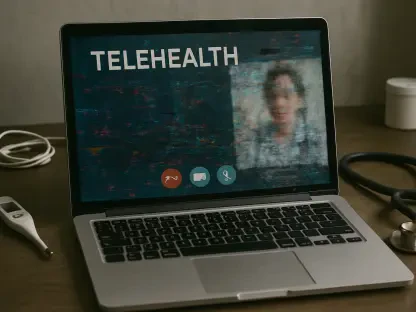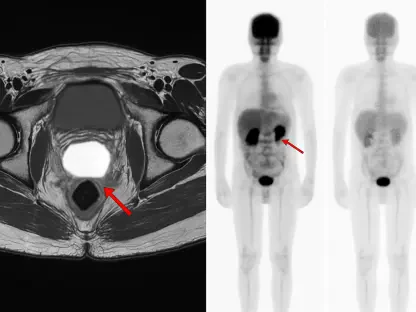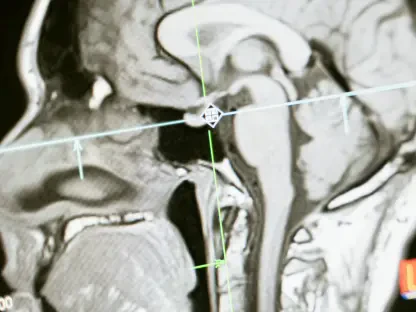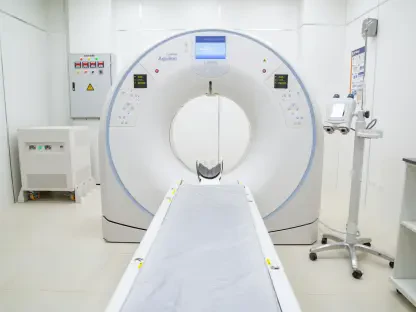The concerning rise in data breaches within the healthcare sector in 2024 has brought to light significant vulnerabilities and impacts faced by the industry. A recent report by financial and risk advisory firm Kroll highlights this alarming trend and its implications, urging the need for enhanced cybersecurity measures.
Increasing Prevalence of Data Breaches
Alarming Statistics
In 2024, the healthcare industry witnessed a dramatic increase in cyberattacks, accounting for 23% of data breaches managed by Kroll, a notable rise from 18% in 2023. This stark increase underscores the growing risk and vulnerability healthcare organizations face from cyberattacks. The numbers illustrate a troubling trend that places healthcare data at the forefront of cybercriminal activities, partly due to its high value and the potentially lucrative outcomes for attackers. Healthcare organizations, often perceived as having weaker defenses, become attractive targets, exacerbating the urgency for robust cybersecurity measures to safeguard sensitive information.
Denyl Green, the global head of breach notification at Kroll, stressed the industry’s fairly immature incident response practices, which have exacerbated the problem. As healthcare data breaches continue to be more frequent, the sector’s current security capabilities are being outpaced by evolving cyber threats. This disconnect prompts healthcare organizations to prioritize and invest in advanced security protocols. The increasing frequency of breaches signals not only a need for technological enhancement but also for a cultural shift towards recognizing data security as a critical aspect of patient care and operational integrity.
Healthcare vs. Finance Sector
The healthcare sector’s vulnerabilities have made it a prime target for cybercriminals, overtaking the finance sector in recent years as the most targeted industry. This constant alternation between healthcare and finance as the leading sectors under cyber threat highlights the fluctuating nature of cybercriminal focus. Sensitive health data’s high valuation in black markets and the comparatively lagging cybersecurity standards within the healthcare sector are significant contributing factors. Cybercriminals are not only after financial gain but also value the medical records for identity theft, blackmail, and insurance fraud.
The rise in attacks on healthcare emphasizes a broader issue of cybersecurity across different industries, where potential breaches can have far-reaching consequences. The fluctuating pattern of breaches between sectors reveals a tactical approach by cybercriminals, targeting industries based on perceived weaknesses and potential gain. For healthcare, this necessitates a comprehensive, proactive approach to cybersecurity, integrating advanced technologies, continuous monitoring, and incident response readiness. As cyber threats evolve, the healthcare sector must bolster its defenses to protect invaluable patient data and maintain essential operations.
Notable Incidents and Their Implications
Major Breach at Change Healthcare
One significant breach that highlights the severity of cyberattacks within the healthcare sector occurred at Change Healthcare, a prominent claims processor. The breach, described in the Kroll report, not only disrupted essential payment processes for weeks but also potentially compromised the data of about 190 million people. This incident stands out as the largest healthcare-related data breach ever reported to federal regulators, illustrating the extraordinary scale and impact such breaches can have. The breach affected multiple layers of the healthcare ecosystem, from patients to providers, causing both immediate operational disruption and long-term data security concerns.
The implications of this breach are profound, as it underscores the inherent risks associated with handling vast amounts of sensitive health information. The incident illuminated the critical need for healthcare organizations to fortify their cybersecurity infrastructure. Change Healthcare’s breach serves as a cautionary tale, emphasizing that the potential fallout from inadequate security measures can be extensive, affecting not just payment systems but also eroding patient trust. It highlights the urgency for healthcare providers to adopt rigorous data protection practices, comprehensive risk assessments, and contingency planning to address and mitigate such cyber threats effectively.
Consumer Concerns and Reactions
Following high-profile data breaches, there has been a noticeable shift in consumer behavior, with healthcare showing the highest percentage of individuals who adopted credit and identity monitoring services post-breach. This reaction indicates heightened consumer anxiety and a growing concern over the safety of personal health information. The breaches have sparked a need for greater transparency and assurance from healthcare providers regarding data security measures. Consumers are increasingly aware of the risks and potential consequences of data breaches, driving them to seek additional protective measures like monitoring services to guard against identity theft and fraud.
The industry’s struggle to reassure patients about data security is palpable, as breaches not only affect operational integrity but also damage the reputation and trust that healthcare providers strive to maintain. As patients become more wary, the pressure on healthcare organizations to enhance their cybersecurity practices and communicate those measures effectively intensifies. The sector must address both the technical and communicative aspects of data security, ensuring that patients are informed of the steps taken to protect their information and how they can safeguard themselves in the event of a breach.
Financial and Operational Impact
Cost Implications
The financial ramifications of data breaches are extensive, with an influx of consumers seeking identity and credit monitoring services significantly driving up costs for healthcare organizations and their insurers. Post-breach scenarios often involve substantial expenses related to damage control, including legal fees, regulatory fines, and the costs associated with implementing enhanced security measures. The financial burden is not limited to immediate expenses but extends to long-term investments in cybersecurity infrastructure and ongoing monitoring efforts to prevent future incidents. This scenario can strain the financial resources of healthcare providers, impacting their ability to invest in other critical areas of patient care and innovation.
Moreover, the reputational damage caused by breaches can have lasting financial consequences, as patients and partners may lose confidence in the affected organizations. The cost of regaining trust and rebuilding a secure, reliable reputation may require significant marketing and public relations efforts, further adding to the overall financial impact. Healthcare organizations must recognize the financial stakes involved and prioritize cybersecurity as a fundamental aspect of their operations. By doing so, they can mitigate the costs associated with breaches and ensure sustainable, secure patient care practices.
Operational Disruptions
Operational disruptions resulting from data breaches can be severe, affecting healthcare organizations’ ability to deliver essential services. Breaches can lead to system shutdowns, compromised patient records, and delays in critical medical processes, directly impacting patient care and organizational efficiency. The aftermath of a breach often requires extensive investigation and remediation efforts, diverting resources from day-to-day operations and potentially causing significant downtime. This scenario highlights the critical importance of robust cybersecurity protocols and incident response plans to minimize the operational impact and ensure continuity of care even in the face of cyber threats.
The need for continuous training and awareness among healthcare staff is also paramount, as human error plays a significant role in data breaches. Ensuring that all members of the organization are equipped with the knowledge and skills to recognize and respond to cyber threats can enhance the overall security posture. Implementing stringent access controls, regular security audits, and real-time monitoring systems are essential strategies to protect sensitive health data and maintain operational integrity. Ultimately, a proactive approach to cybersecurity can help healthcare organizations navigate the complex landscape of digital threats and ensure the safeguarding of both patient data and critical medical services.
Urgent Need for Enhanced Cybersecurity
Current Security Capabilities
The report published by Kroll in the spring of 2024 highlights a severe shortage of advanced security capabilities in the healthcare sector. This deficiency underscores the urgent necessity for enhanced cybersecurity measures. The current state of security within many healthcare organizations is inadequate to combat the sophisticated and evolving nature of modern cyber threats. The industry’s reliance on outdated systems and lack of investment in cutting-edge technology has left it vulnerable. There is a pressing need for healthcare providers to adopt advanced security technologies, such as artificial intelligence and machine learning, to detect and respond to threats in real-time.
Healthcare organizations must also focus on cultivating a culture of security awareness and preparedness. By integrating regular security training, rigorous risk assessments, and continuous monitoring, the sector can strengthen its overall security posture. The investment in both technology and human resources is essential to mitigate risks and build a resilient defense against cyberattacks. This approach will ensure that healthcare providers can protect sensitive health data, maintain patient trust, and uphold their commitment to delivering safe, reliable medical services.
Importance of Advanced Incident Response
The alarming increase in data breaches within the healthcare sector in 2024 has exposed critical vulnerabilities and significant impacts on the industry. According to a recent report by financial and risk advisory firm Kroll, this concerning trend emphasizes the imperative need for improved cybersecurity measures. The healthcare sector, which historically lagged behind other industries in cybersecurity, is now facing the consequences of this shortfall. The breaches not only compromise patient confidentiality but also incur substantial financial losses and damage the reputation of healthcare providers. Cybercriminals target the sector due to the high value of medical records, which contain personal, financial, and health information. The report by Kroll suggests that healthcare organizations must prioritize investment in advanced cybersecurity systems, regular staff training, and strict data protection protocols. Robust cybersecurity strategies are essential to safeguard sensitive medical data, maintain patient trust, and ensure the continuity of healthcare services.









